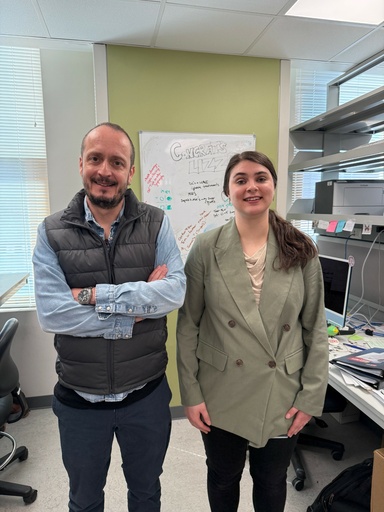
Elizabeth Escue successfully defended her M.S. thesis on March 26, 2025, completing the Pathology M.S. program. Her thesis, titled The Ability of Memory CD8 T Cell Subsets to Numerically and Functionally Recover Following Whole-Body Irradiation is Influenced by Their History of Cognate Antigen Exposures, explores the impact of whole-body irradiation (WBI) on memory CD8 T cells with repeated cognate-antigen (cognate-Ag) exposures. She conducted her research in the laboratory of Dr. Vladimir Badovinac, where she characterized how WBI affects these immune cells.
Radiation induces cell death by creating double-stranded DNA (dsDNA) breaks within the DNA backbone. Cells unable to repair this damage undergo apoptosis. Naïve and primary memory (1M) CD8 T cells are particularly susceptible, and lymphopenia is observed in the acute phase following high-dose radiation exposure in humans. The Badovinac lab has previously studied the long-term effects of radiation on 1M CD8 T cell numbers, function, and subset composition. However, before Elizabeth’s work, the impact of radiation on memory CD8 T cells that had undergone multiple cognate-Ag exposures remained uncharacterized.
Her research demonstrated that quaternary memory (4M) CD8 T cells were just as susceptible to radiation-induced cell death as 1M CD8 T cells. However, unlike 1M CD8 T cells, 4M CD8 T cell numbers continued to decline until they were no longer detectable in peripheral blood lymphocytes (PBLs). Additionally, 4M CD8 T cell numbers remained diminished in the spleens of irradiated mice for over 300 days post-irradiation. Both 1M and 4M CD8 T cells exhibited a similarly reduced capacity for cytokine production upon peptide stimulation 10 days post-WBI. However, following an in vivo challenge, irradiated 4M CD8 T cells were the least capable of proliferating, resulting in fewer effector cells. Furthermore, WBI caused long-term alterations in the subset composition of both 1M and 4M CD8 T cell memory compartments.
In summary, Elizabeth’s thesis characterizes how WBI affects repeatedly stimulated memory CD8 T cells, highlighting key differences between 1M and 4M CD8 T cell responses post-exposure. Her findings provide critical insights into the effects of radiation exposure on the CD8 T cell compartment as a whole and suggest potential functional deficits that may impair irradiated patients' responses to future infections and vaccinations.
Elizabeth’s thesis committee included Dr. Badovinac, Dr. John Harty, and Dr. Kevin Legge. Additionally, she is a co-author on a recent publication from the Harty laboratory and maintains multiple ongoing collaborations with members of the Badovinac lab and other researchers.